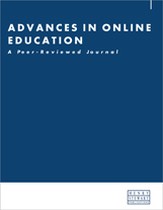Beyond asynchrony: Evaluating hybrid and live online teaching
Abstract
The research and advice in Evaluating Online Teaching (2015) covered the range of then-possible online instructional scenarios — what we might nowadays call ‘traditional’ online spaces such as learning management system (LMS) shells that afforded a highly mediated and structured range of possible interactions among instructors, learners and the tool sets within those spaces. Largely asynchronous, online teaching left a clear trail of observable phenomena. Announcement posts, discussion threads and comments on student work were all captured in the LMS space. At the time of publication, we worried that such a cornucopia of observable data points would lead to ‘analysis paralysis’, and we advised observers of online teaching to limit their observations to one unit or online session, much as an on-ground observer might observe only one or two class periods of live class time. We now find ourselves in an instructional world where the bounded environment of the LMS seems almost simple. Especially as a result of the emergency remote instruction during the COVID-19 pandemic, the possible permutations and definitions of ‘online teaching’ have exploded. For those of us tasked with observing, evaluating, crediting and critiquing the teaching that happens at our institutions, we can no longer assume that looking in one ‘place’ — whether that is a classroom, an LMS shell or a Zoom recording of a live remote session — will afford us a representative sample of the teaching practices and behaviours that instructors exhibit. This best-practice paper outlines what has changed in technology-supported and technology-mediated teaching and offers ways to observe and assess online teaching that are consistent, equitable and fair.
The full article is available to subscribers to this journal (subscription is free).
Author's Biography
Thomas J. Tobin helped found the University of Wisconsin-Madison Center for Teaching, Learning, & Mentoring (CTLM). He is an internationally recognised scholar, author and speaker on quality in technology-mediated education — especially copyright, teaching evaluation, academic integrity and accessibility/universal design for learning. He holds a Master’s and PhD in English literature, an information science Master’s and certifications in project management (PMP), online teaching (MOT), Quality Matters (QM), accessibility (CPACC) and academic leadership (Penn State ALA). Named to Ed Tech Magazine’s 2020 ‘Dean’s List’ of educational technology Influencers and honoured with the 2022 Wagner Award for Outstanding Leadership in Distance Learning Administration, Tom serves on the editorial boards of InSight: A Journal of Scholarly Teaching and the Online Journal of Distance Learning Administration. His books include Evaluating Online Teaching: Implementing Best Practices (2015) with Jean Mandernach and Ann H. Taylor, The Copyright Ninja (2017), Reach Everyone, Teach Everyone: Universal Design for Learning in Higher Education (2018) with Kirsten Behling, Going Alt-Ac: A Guide to Alternative Academic Careers (2020) with Katie Linder and Kevin Kelly, and UDL for FET Practitioners: Implementing Universal Design for Learning in Irish Further Education and Training (2021) with Ann Heelan.
Citation
Tobin, Thomas J. (2023, March 1). Beyond asynchrony: Evaluating hybrid and live online teaching. In the Advances in Online Education: A Peer-Reviewed Journal, Volume 1, Issue 3. https://doi.org/10.69554/JFGM6639.Publications LLP
